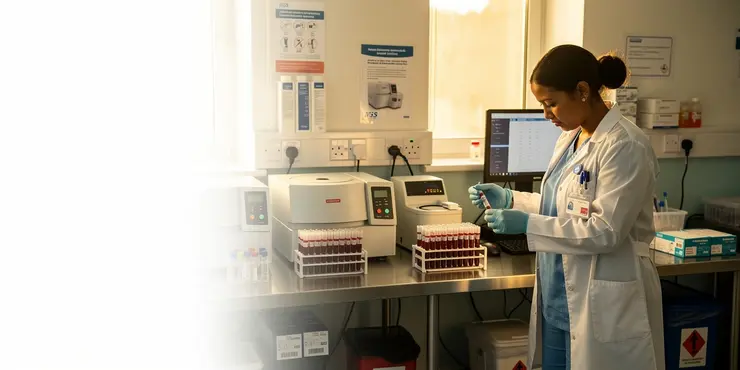
Find Help
More Items From Ergsy search
-

Are there any parasites that can be transmitted through blood transfusions?
Relevance: 100%
-

What diseases can be spread by blood transfusions?
Relevance: 73%
-
Is malaria still a concern for blood transfusion safety?
Relevance: 71%
-

Is Chagas disease a concern with blood transfusions?
Relevance: 69%
-

What measures are taken to prevent disease transmission in blood transfusions?
Relevance: 68%
-

Is HTLV a risk in blood transfusions?
Relevance: 63%
-
Can bacterial infections be transmitted through blood transfusion?
Relevance: 61%
-

How is blood screened to prevent disease transmission?
Relevance: 61%
-

Is Hepatitis B a risk in blood transfusions?
Relevance: 60%
-
Can HIV be transmitted through blood transfusions?
Relevance: 59%
-
Can Dengue fever be transmitted through blood transfusions?
Relevance: 59%
-

Can syphilis be transmitted via blood transfusion?
Relevance: 59%
-

What is the most common disease transmitted by blood transfusion?
Relevance: 59%
-
Blood Product Transfusions
Relevance: 58%
-

Can COVID-19 be transmitted through blood transfusions?
Relevance: 57%
-
What is a blood transfusion?
Relevance: 57%
-
Is Zika virus screened for in blood transfusions?
Relevance: 56%
-

Blood Transfusion
Relevance: 55%
-
Can you get any prion diseases from blood transfusion?
Relevance: 54%
-

Are there risks associated with blood transfusions?
Relevance: 54%
-

What types of blood products can be transfused?
Relevance: 54%
-
Is there an age limit for receiving blood transfusions?
Relevance: 52%
-
Why might someone need a blood transfusion?
Relevance: 51%
-
How long does a blood transfusion take?
Relevance: 50%
-
What are some common reasons blood transfusions are needed?
Relevance: 49%
-
Can someone have a reaction to a mismatched blood transfusion?
Relevance: 49%
-

Can cytomegalovirus (CMV) be spread through transfusions?
Relevance: 49%
-

How do healthcare providers match blood for transfusions?
Relevance: 48%
-
Can people of any blood type receive a transfusion of any blood type?
Relevance: 48%
-
Can certain medical conditions prevent receiving blood transfusions?
Relevance: 47%
-

How do doctors determine how much blood is needed for a transfusion?
Relevance: 46%
-
Why is blood donation history important in preventing disease transmission?
Relevance: 43%
-
Are new emerging pathogens a risk for blood safety?
Relevance: 40%
-
Is blood used for transfusions safe?
Relevance: 40%
-

What is plasma, and why might it be transfused?
Relevance: 39%
-

Are there global differences in screening for blood transfusions?
Relevance: 38%
-

What other viruses are tested for in blood donations?
Relevance: 36%
-

What are Screw Worms parasites?
Relevance: 35%
-
What should a patient expect after a blood transfusion?
Relevance: 35%
-
What kind of follow-up care is needed after a blood transfusion?
Relevance: 34%
Parasites and Blood Transfusions: An Overview
Blood transfusions are an essential medical procedure that help save countless lives each year. However, like any medical procedure, they come with certain risks. One such risk is the potential transmission of parasites. While the risk is generally low, certain parasitic infections can be transmitted through donated blood. It is vital for both the healthcare system and potential blood donors to understand these risks to ensure the safety of the blood supply.
Common Parasites Transmissible via Blood Transfusion
There are a few known parasites that can potentially be transmitted through blood transfusions. The most notable among these are malaria, babesiosis, Chagas disease, and leishmaniasis. These infections are widely known and are of particular concern in regions where these diseases are endemic.
Malaria is caused by Plasmodium parasites, which are primarily transmitted through the bites of infected Anopheles mosquitoes. However, because these parasites live in red blood cells, a blood transfusion from an infected donor could theoretically transmit the disease to the recipient. In the UK, stringent donor screening processes significantly reduce this risk. Potential donors who have visited malaria-endemic areas may be deferred from donating blood for a period.
Babesiosis and Chagas Disease
Babesiosis is caused by the Babesia parasite and is similar to malaria in that it infects red blood cells. Like malaria, it can potentially be transmitted through blood transfusions. While rare in the UK, precautions are in place to prevent transmission from donors who might have been exposed.
Chagas disease is another parasitic infection that can be transmitted via transfusion. It is caused by Trypanosoma cruzi, a parasite endemic to Central and South America. Transmission in the UK is rare due to rigorous screening of blood donors, especially those with a history of living in or visiting endemic regions.
Prevention and Risk Mitigation
The primary method for preventing the transmission of these and other infectious diseases through blood transfusions is careful donor screening. In the UK, the NHS Blood and Transplant service employs rigorous guidelines to evaluate each potential donor's travel history, health status, and risk factors for various infections.
Additionally, advances in testing allow for better detection of potential pathogens in donated blood. This includes nucleic acid testing (NAT), which can identify the presence of certain parasitic DNA in the blood supply. These combined efforts help ensure the blood transfusion process remains as safe as possible for recipients.
Conclusion
While the potential for parasitic transmission through blood transfusions exists, comprehensive screening and testing protocols help make this risk minimal in the UK. Awareness and continued vigilance remain crucial to prevent potential transmission, ensuring the ongoing safety and reliability of the blood supply.
Frequently Asked Questions
What are bloodborne parasites?
Bloodborne parasites are organisms that can live in the bloodstream and can be transmitted through blood or blood products.
Can parasites be transmitted through blood transfusions?
Yes, certain parasites can be transmitted through blood transfusions if the blood is not screened properly.
Which parasites are commonly transmitted via blood transfusion?
Parasites such as Plasmodium species (causing malaria), Trypanosoma cruzi (causing Chagas disease), and Babesia microti (causing babesiosis) can be transmitted through blood transfusions.
How is malaria related to blood transfusions?
Malaria is caused by Plasmodium parasites and can be transmitted through blood transfusions if the donor is infected.
What is Chagas disease and how is it transmitted?
Chagas disease is caused by the parasite Trypanosoma cruzi and can be transmitted through blood transfusions, organ transplants, and from mother to child during pregnancy.
Is babesiosis a concern for blood transfusions?
Yes, Babesia microti can be transmitted through blood transfusions and is a particular risk in areas where babesia is endemic.
What measures are taken to prevent parasitic transmission through blood transfusions?
Blood donor screening, including travel history and laboratory testing for certain parasites, helps prevent transmission through blood transfusions.
Are all blood donations tested for parasites?
Not all blood donations are tested for all parasites, but blood centers use risk-based screening and focus on endemic regions and high-risk groups.
How effective is blood donor screening in preventing transmission?
Blood donor screening significantly reduces the risk of transmission but may not eliminate it entirely, especially for emerging or less common parasites.
What role do blood banks play in preventing transmission of parasites?
Blood banks implement screening processes, conduct risk assessments, and may defer donors who have traveled to or lived in areas with known parasitic risks.
Can donor questioning help identify risks of parasitic transmission?
Yes, thorough donor questioning regarding travel history, symptoms, and health can help identify potential risks for parasitic infections.
What is the risk of blood transfusion-associated malaria in non-endemic countries?
The risk is low in non-endemic countries, but vigilance is still required due to factors such as international travel and migration.
How do blood transfusion services respond to emerging parasitic diseases?
Blood services update their screening protocols and donor assessments in response to emerging parasitic threats, guided by public health data.
Is there a test for Chagas disease in blood donations?
Yes, in areas where Chagas disease is a concern, blood donations may be tested for Trypanosoma cruzi antibodies to prevent transmission.
Are there regulations for blood screening regarding parasites?
Regulations vary by country, but many have guidelines to screen for known parasitic risks based on local epidemiology.
Can a person contract diseases other than from viruses and bacteria through blood transfusions?
Yes, aside from viruses and bacteria, parasitic infections can also be transmitted through blood transfusions.
Why is the blood supply considered safe despite the risk of parasites?
The blood supply is considered safe due to stringent screening and testing protocols that significantly reduce the risk of infection.
Can preventative measures in donors prevent parasitic transmission?
Yes, donors avoiding risky behaviors and adhering to travel advisories can help minimize the risk of transmitting parasites.
Is there ongoing research to improve blood safety concerning parasitic infections?
Yes, research is ongoing to develop better screening tests, understand transmission dynamics, and improve donor management strategies.
How can recipients alleviate concerns about blood transfusion safety?
Recipients can discuss concerns with healthcare providers, who can explain safety procedures and the low risks associated with transfusions.
Useful Links
This website offers general information and is not a substitute for professional advice.
Always seek guidance from qualified professionals.
If you have any medical concerns or need urgent help, contact a healthcare professional or emergency services immediately.
Some of this content was generated with AI assistance. We’ve done our best to keep it accurate, helpful, and human-friendly.
- Ergsy carfully checks the information in the videos we provide here.
- Videos shown by Youtube after a video has completed, have NOT been reviewed by ERGSY.
- To view, click the arrow in centre of video.
- Most of the videos you find here will have subtitles and/or closed captions available.
- You may need to turn these on, and choose your preferred language.
- Go to the video you'd like to watch.
- If closed captions (CC) are available, settings will be visible on the bottom right of the video player.
- To turn on Captions, click settings .
- To turn off Captions, click settings again.
More Items From Ergsy search
-

Are there any parasites that can be transmitted through blood transfusions?
Relevance: 100%
-

What diseases can be spread by blood transfusions?
Relevance: 73%
-
Is malaria still a concern for blood transfusion safety?
Relevance: 71%
-

Is Chagas disease a concern with blood transfusions?
Relevance: 69%
-

What measures are taken to prevent disease transmission in blood transfusions?
Relevance: 68%
-

Is HTLV a risk in blood transfusions?
Relevance: 63%
-
Can bacterial infections be transmitted through blood transfusion?
Relevance: 61%
-

How is blood screened to prevent disease transmission?
Relevance: 61%
-

Is Hepatitis B a risk in blood transfusions?
Relevance: 60%
-
Can HIV be transmitted through blood transfusions?
Relevance: 59%
-
Can Dengue fever be transmitted through blood transfusions?
Relevance: 59%
-

Can syphilis be transmitted via blood transfusion?
Relevance: 59%
-

What is the most common disease transmitted by blood transfusion?
Relevance: 59%
-
Blood Product Transfusions
Relevance: 58%
-

Can COVID-19 be transmitted through blood transfusions?
Relevance: 57%
-
What is a blood transfusion?
Relevance: 57%
-
Is Zika virus screened for in blood transfusions?
Relevance: 56%
-

Blood Transfusion
Relevance: 55%
-
Can you get any prion diseases from blood transfusion?
Relevance: 54%
-

Are there risks associated with blood transfusions?
Relevance: 54%
-

What types of blood products can be transfused?
Relevance: 54%
-
Is there an age limit for receiving blood transfusions?
Relevance: 52%
-
Why might someone need a blood transfusion?
Relevance: 51%
-
How long does a blood transfusion take?
Relevance: 50%
-
What are some common reasons blood transfusions are needed?
Relevance: 49%
-
Can someone have a reaction to a mismatched blood transfusion?
Relevance: 49%
-

Can cytomegalovirus (CMV) be spread through transfusions?
Relevance: 49%
-

How do healthcare providers match blood for transfusions?
Relevance: 48%
-
Can people of any blood type receive a transfusion of any blood type?
Relevance: 48%
-
Can certain medical conditions prevent receiving blood transfusions?
Relevance: 47%
-

How do doctors determine how much blood is needed for a transfusion?
Relevance: 46%
-
Why is blood donation history important in preventing disease transmission?
Relevance: 43%
-
Are new emerging pathogens a risk for blood safety?
Relevance: 40%
-
Is blood used for transfusions safe?
Relevance: 40%
-

What is plasma, and why might it be transfused?
Relevance: 39%
-

Are there global differences in screening for blood transfusions?
Relevance: 38%
-

What other viruses are tested for in blood donations?
Relevance: 36%
-

What are Screw Worms parasites?
Relevance: 35%
-
What should a patient expect after a blood transfusion?
Relevance: 35%
-
What kind of follow-up care is needed after a blood transfusion?
Relevance: 34%


